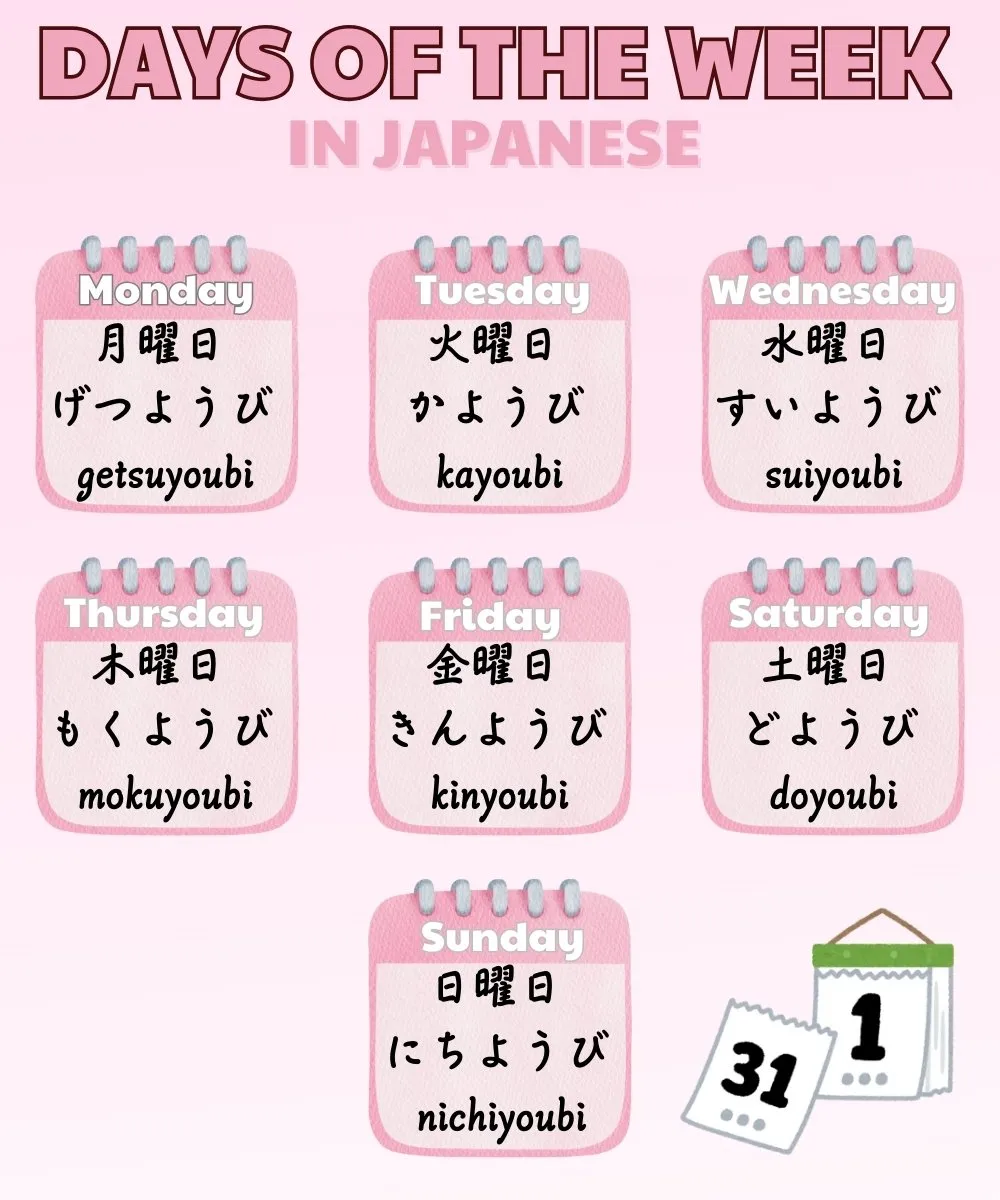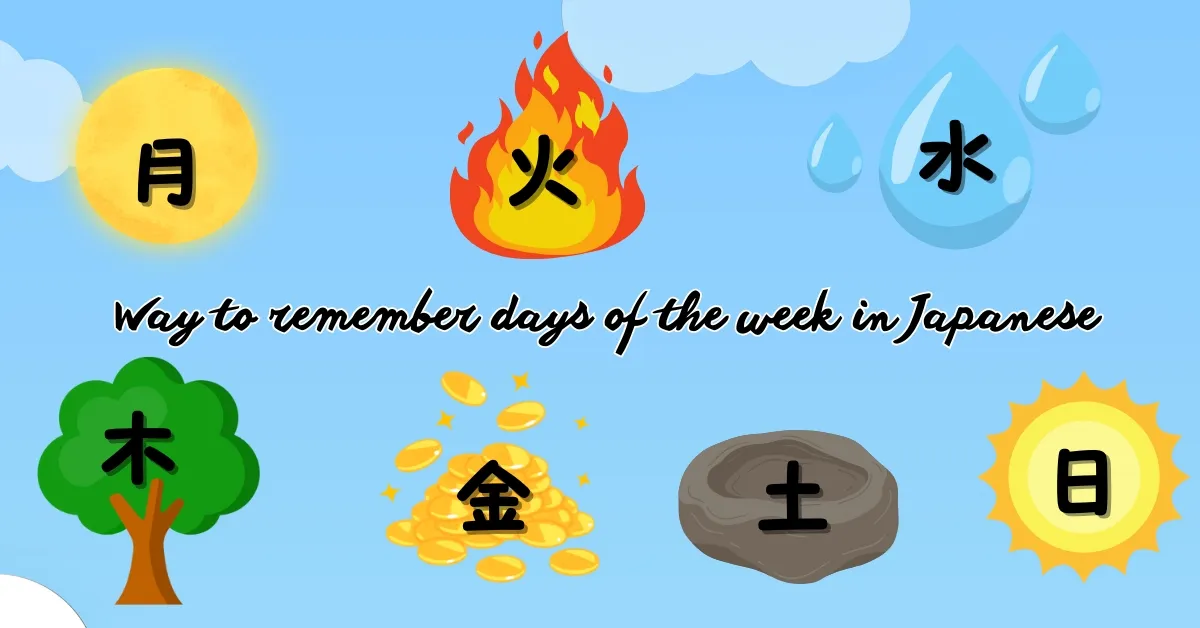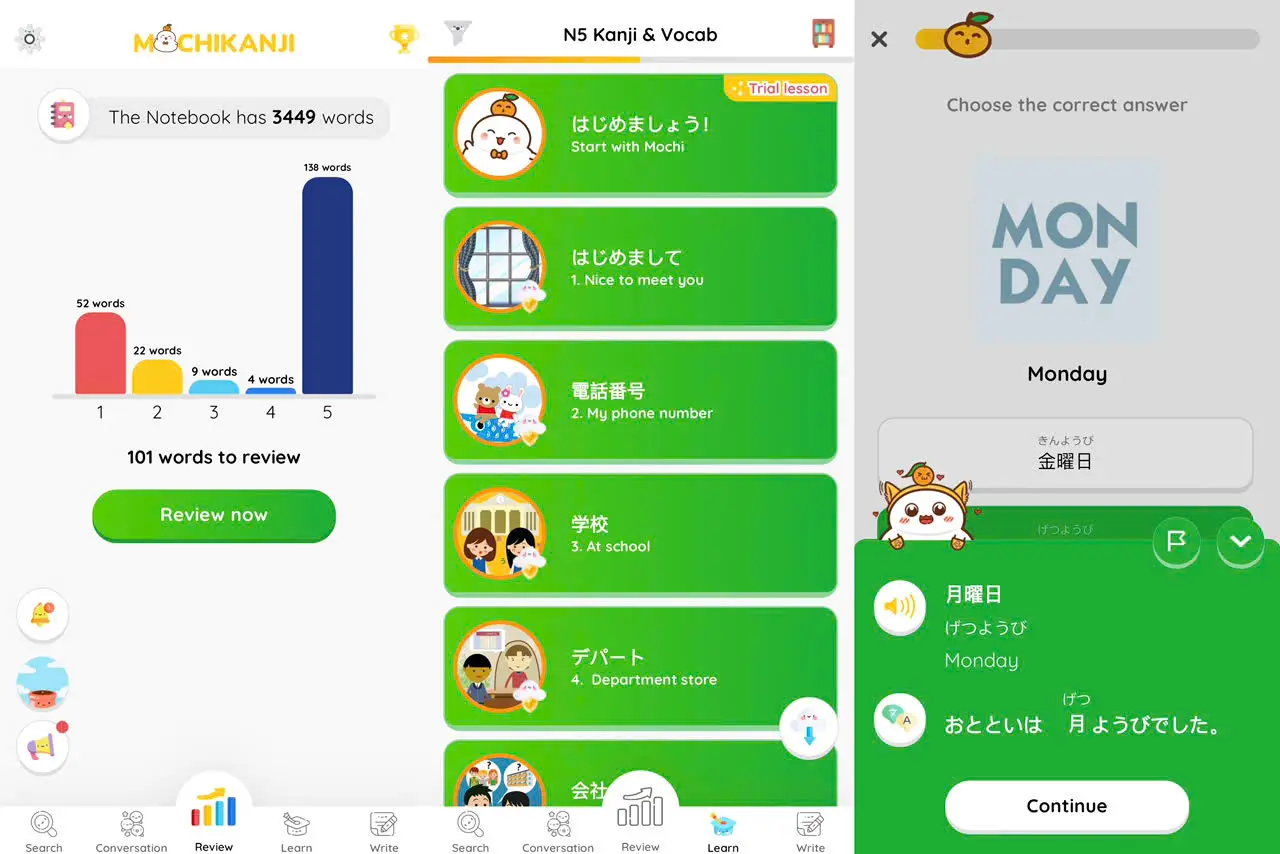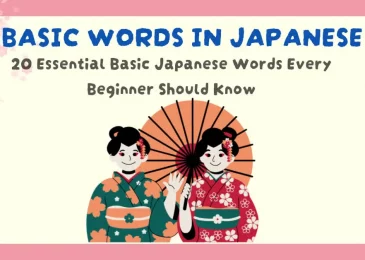Learning the days of the week in Japanese is essential for mastering the language and engaging in everyday conversations. Did you know that each day corresponds to a celestial body? For example, Monday (月曜日 – getsuyoubi) is named after the moon, while Saturday (土曜日 – doyoubi) is associated with the earth!
Join us as we explore the meanings and pronunciations of the days of the week in Japanese, taking your first step toward fluency in this captivating language.
Why Learn Days of the Week in Japanese?
Essential for Daily Conversations
The days of the week in Japanese are commonly used in everyday discussions, whether you’re making plans, scheduling appointments, or discussing past and future events. Mastering this vocabulary allows you to communicate more effectively in various social and professional contexts.
Building Block for Time-Related Vocabulary
Understanding how to express the days of the week in Japanese lays the groundwork for more complex time-related phrases. You’ll find it easier to learn about months, seasons, and time expressions when you’re comfortable with the basics. By mastering the days of the week in Japanese, you’ll gain confidence in your ability to learn more complex structures and vocabulary, paving the way for advanced language skills.
Helpful for Travel
If you plan to visit Japan, knowing the days of the week in Japanese will be invaluable for navigating your itinerary, booking accommodations, and participating in local events. It enables you to ask questions confidently and interact with locals.
Learning the days of the week in Japanese is not just about memorization; it’s about enhancing your ability to communicate, understand culture, and enjoy the language learning process.
How do you say the days of the week in Japanese?
Below is a breakdown of the days of the week in Japanese along with their meanings and pronunciations:
1. Monday (月曜日)
- Meaning: Moon day, 月 stands for “moon.” As in many cultures, 月曜日 is associated with the moon, marking the start of the week in Japan.
- Pronunciation: げつようび – getsuyoubi
2. Tuesday (火曜日)
- Meaning: Fire day, 火 translates to “fire,” referring to Mars, known as the “Fire Star” in ancient Japanese astronomy due to its distinctive red hue.
- Pronunciation: かようび – kayoubi
3. Wednesday (水曜日)
- Meaning: Water day, 水 means “water,” which is associated with Mercury, referred to as the “Water Star,” connecting it to fluidity and change.
- Pronunciation: すいようび – suiyoubi
4. Thursday (木曜日)
- Meaning: Wood day, 木 signifies “wood” or “tree,” linked to Jupiter, the “Wood Star.” This symbolizes growth and vitality.
- Pronunciation: もくようび – mokuyoubi
5. Friday (金曜日)
- Meaning: Gold day, 金 means “gold” or “metal,” associated with Venus, known as the “Metal Star,” representing beauty and love.
- Pronunciation: きんようび – kinyoubi
6. Saturday (土曜日)
- Meaning: Earth day, 土 stands for “earth,” relating to Saturn, the “Earth Star,” embodying stability and grounding.
- Pronunciation: どようび – doyoubi
7. Sunday (日曜日)
- Meaning: Sun day, 日 means “sun.” Thus, 日曜日 translates to “sun day,” which is linked to Amaterasu, the sun goddess in Shinto mythology, highlighting its cultural significance.
- Pronunciation: にちようび – nichiyoubi

How to Remember the Days of the Week in Japanese
Mastering the days of the week in Japanese (曜日 – ようび – youbi) is essential for effective communication. Here are some helpful tips to remember these important terms.
Visual Memory Tips:
Using visual aids can significantly enhance your memory. Create a colorful poster that lists all the days of the week in Japanese along with their meanings and kanji. For example:
- Sunday: 日曜日 (にちようび – Nichiyoubi) – “Sun day”
- Monday: 月曜日 (げつようび – Getsuyoubi) – “Moon day”
You can also draw pictures next to each day to help reinforce the connection. Associating images with words makes it easier to recall the days of the week in Japanese when you need them.

Apps and Flashcards:
Using language learning apps is a great way to reinforce your understanding. Create flashcards with the kanji on one side and the romaji and English meaning on the other side. Review them regularly to strengthen your memory.

One of the Japanese learning apps that offers vocabulary lessons focused on daily life is MochiKanji. This app offers fun lessons and quizzes on vocabulary, including the days of the week in Japanese. You can memorize 1,000 words and Kanji in a month.
Daily Practice Suggestions
- Use them in sentences: Practice saying things like, “Today is Wednesday” (今日は水曜日です – Kyou wa suiyoubi desu) or “I will see you on Friday” (金曜日に会いましょう – Kinyoubi ni aimashou).
- Label your calendar: If you keep a planner or calendar, label each day with its Japanese name. This constant exposure helps reinforce your memory.
- Speak with friends: If you have language partners or friends who are also learning Japanese, practice discussing your schedules using the days of the week in Japanese.

By using these tips, you can effectively learn and remember the days of the week in Japanese. Regular practice, visual aids, and the right tools will help you become confident in using these essential terms in conversation.
What other Japanese words are useful for talking about days of the week?
When discussing days of the week in Japanese, you might also find these words helpful:
- 今日 (きょう, kyou): Today
- 明日 (あした, ashita): Tomorrow
- 昨日 (きのう, kinou): Yesterday
- 週 (しゅう, shuu): Week
- 来週 (らいしゅう, raishuu): Next week
- 先週 (せんしゅう, senshuu): Last week
- 毎日 (まいにち, mainichi): Every day
How to Use Days of the Week in Sentences
Knowing how to use the days of the week in Japanese (曜日 – ようび – youbi) is crucial for everyday conversations. Here’s how to incorporate them into your speech:
- What day is it today? 今日は何曜日ですか。 (Kyou wa nan youbi desu ka.)
- Today is Monday. 今日は月曜日です。 (Kyou wa getsuyoubi desu.)
- Tomorrow is Friday. 明日は金曜日です。 (Ashita wa kinyoubi desu.)
- Let’s meet next Wednesday. 来週の水曜日に会いましょう。 (Raishuu no suiyoubi ni aimashou.)
- I will go shopping on Sunday.
日曜日に買い物に行きます。 (Nichiyoubi ni kaimono ni ikimasu.)
- Do you have plans for Thursday?
木曜日に予定はありますか。 (Mokuyoubi ni yotei wa arimasu ka.)
- I study Japanese every Friday.
毎週金曜日に日本語を勉強します。 (Maishuu kinyoubi ni nihongo o benkyou shimasu.)
Conclusion
The days of the week in Japanese are essential for daily life and are deeply rooted in culture. Each day from Monday to Sunday has its own meaning and is linked to specific activities. Understanding the days of the week in Japanese is crucial for anyone learning the language. By mastering them, you can enhance your daily conversations and business communication.
Utilize this knowledge to deepen your understanding of Japanese culture and continue your enjoyable learning journey!





